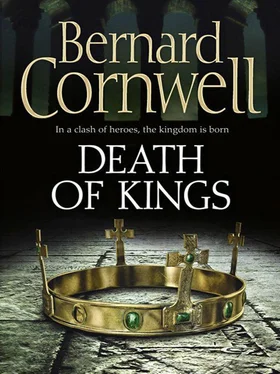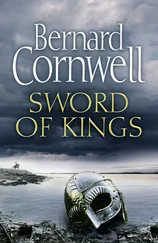‘You’re a shipmaster?’ I asked.
‘I was, maybe I will be again. I miss the sea.’ He ran his hand along the smooth wood of her top strake. ‘Isn’t she lovely?’
‘She’s beautiful,’ I said.
‘Jarl Sigurd had her built,’ he said, ‘and only the best for him!’ He rapped the hull. ‘Green oak from Frisia. Too big for you, though.’
‘She’s for sale?’
‘Never! Jarl Sigurd would rather sell his only son into slavery! Besides, how many oars do you want? Twenty?’
‘No more,’ I said.
‘She needs fifty rowers,’ Frithof said, rapping the Bright-Flyer ’s planks again. He sighed, remembering her at sea.
I looked at the carpenter’s tools. ‘You’re readying her for sea?’ I asked.
‘The jarl hasn’t said, but I hate to see ships out of the water for too long. The timbers dry and shrink. I want to float that one next,’ he pointed to the head of the cove where another beauty was propped on thick oak shafts. ‘ Sea-Slaughterer ,’ Frithof said, ‘Jarl Cnut’s ship.’
‘He keeps his ships here?’
‘Just the two,’ he said, ‘ Sea-Slaughterer and Cloud-Chaser .’ Men were caulking the Sea-Slaughterer , stuffing the plank joints with a mix of wool and pine-tar. Small boys helped, or else played on the river bank. The tar braziers smoked, drifting their pungent smell across the slow river. Frithof stepped back onto the wharf and patted the head of the man who was painting the white line onto the strake. Frithof was obviously popular. Men grinned and called out respectful greetings, and Frithof responded with generous pleasure. He had a pouch at his waist filled with scraps of smoked beef that he handed to the children, all of whose names he knew. ‘This is Kjartan,’ he introduced me to the men caulking the Sea-Slaughterer , ‘and he wants to take a boat off our hands. He’s going back to Frisia because his wife is there.’
‘Bring the woman here!’ a man called to me.
‘He’s got more sense than letting you scum ogle her,’ Frithof retorted, then led me further down the bank past a huge heap of ballast stones. Frithof had Sigurd’s authority to buy or sell ships, but only a half-dozen were for sale, and of those only two would suit me. One was a trading ship, broad in the beam and well made, but she was short, her length only about four times her beam, and that would make her slow. The other ship was older and much used, but she was at least seven times longer than her beam, and her sleek lines were sweet. ‘She belonged to a Norseman,’ Frithof told me, ‘who got himself killed in Wessex.’
‘Made of pine?’ I asked, rapping the hull.
‘She’s all spruce,’ Frithof said.
‘I’d prefer oak,’ I said grudgingly.
‘Give me gold and I’ll have a ship built for you out of the best Frisian oak,’ Frithof said, ‘but if you want to cross the sea this summer you’ll do it in pine. She was well made, and she has a mast, sail and rigging.’
‘Oars?’
‘We’ve plenty of good ash oars.’ He ran his one hand down the stem-post. ‘She needs a little work,’ he admitted, ‘but she was a sweetheart in her day. Tyr’s Daughter .’
‘That’s her name?’
Frithof smiled. ‘It is.’ He smiled because Tyr is the god of the warriors who fight in single combat and, like Frithof, Tyr is one-handed, having lost his right hand to the sharp fangs of Fenrir, the crazed wolf. ‘Her owner liked Tyr,’ Frithof said, still stroking the stem-post.
‘She has a beast-head?’
‘I can find you something.’
We haggled, though good-naturedly. I offered what little silver I had left, along with all our horses, saddles and bridles, and Frithof at first demanded a sum at least double the worth of those things, though in truth he was glad to be rid of Tyr’s Daughter . She might have been a fine ship once, but she was old and she was small. A ship needs fifty or sixty men to be safe, and Tyr’s Daughter would have been crowded by thirty men, but she was perfect for my purpose. If I had not bought her I suspect she would have been broken up for firewood and, in truth, I got her cheap. ‘She’ll get you to Frisia,’ Frithof assured me.
We spat on our palms, shook hands, and so I became the owner of Tyr’s Daughter . I had to buy pine-tar to caulk her, and we spent two days on the river bank forcing a thick mix of hot tar, horsehair, moss and fleece into the planking. Her mast, sails and hemp rigging were brought from storage to the meadow where the boats were grounded, and I insisted my men leave the filthy tavern and sleep with the ship. We rigged the sail as a tent over her and slept either in or beneath her hull.
Frithof seemed to like us, or else he just approved of the notion that one of his ships was going back into the water. He would bring ale to the meadow, which lay some four or five hundred paces from the nearest part of Snotengaham’s ramparts, and he would drink with us and tell old stories of long ago fights, and in return I told him of the voyages I had made. ‘I miss the sea,’ he said wistfully.
‘Come with us,’ I invited him.
He shook his head ruefully. ‘Jarl Sigurd’s a good lord, he looks after me.’
‘Will I see him before I leave?’ I asked.
‘I doubt it,’ Frithof said, ‘he and his son have gone to help your old friend.’
‘Haesten?’
Frithof nodded. ‘You stayed with him through the winter?’
‘He kept promising us other men would join him,’ I invented, ‘he said they’d come from Ireland, but no one did.’
‘He did well enough last summer,’ Frithof said.
‘Until the Saxons took his fleet,’ I commented sourly.
‘Uhtred of Bebbanburg,’ Frithof spoke just as sourly, then touched the hammer he wore about his neck. ‘Uhtred is besieging him now. Is that why you left?’
‘I don’t want to die in Britain. So, yes, that’s why we left.’
Frithof smiled. ‘Uhtred will die in Britain, my friend. Jarl Sigurd has gone to kill the bastard.’
I touched my hammer. ‘May the gods give the jarl victory,’ I said piously.
‘Kill Uhtred,’ Frithof said, ‘and Mercia falls, and when Alfred dies, Wessex falls.’ He smiled. ‘Why would a man want to be in Frisia when all that happens?’
‘I miss home,’ I said.
‘Make your home here!’ Frithof said enthusiastically. ‘Join Jarl Sigurd and you can choose your own estate in Wessex, you can take a dozen Saxon wives and live like a king!’
‘But I have to kill Uhtred first?’ I asked lightly.
Frithof touched his amulet again. ‘He’ll die,’ he said, and his voice was anything but light.
‘Many men have tried to kill him,’ I said. ‘Ubba tried!’
‘Uhtred has never faced Jarl Sigurd in battle,’ Frithof said, ‘nor the Jarl Cnut, and Jarl Cnut’s sword is swift as the snake’s tongue. Uhtred will die.’
‘All men die.’
‘His death is foretold,’ Frithof said, and, when he saw my interest, he touched the hammer again. ‘There’s a sorceress,’ he explained, ‘and she has seen his death.’
‘Where? When?’
‘Who knows?’ he asked. ‘She knows, I suppose, and that’s what she promised the jarl.’
I felt a sudden, strange pang of jealousy. Had Erce straddled Sigurd in the night as she had straddled me? Then I thought Ælfadell had forecast my death to Sigurd, but had denied it to me, and that meant she either lied to one of us or that Erce, despite her loveliness, was no goddess.
‘Jarl Sigurd and Jarl Cnut are doomed to fight Uhtred,’ Frithof went on, ‘and the prophecy says the jarls will win, Uhtred will die and Wessex will fall. And that means you’re missing an opportunity, my friend.’
Читать дальше
Конец ознакомительного отрывка
Купить книгу












